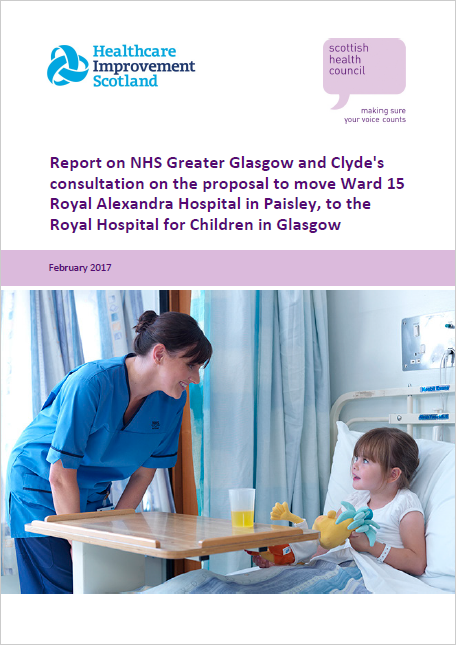Major service change report
The guidance followed in publishing this report has since been superseded by the Planning with People guidance
NHS Greater Glasgow and Clyde's consultation on the proposal to move Ward 15 Royal Alexandra Hospital in Paisley to the Royal Hospital for Children in Glasgow
This report sets out our assessment of whether NHS Greater Glasgow and Clyde's proposal to move Ward 15 Royal Alexandra Hospital in Paisley to the Royal Hospital for Children in Glasgow followed Scottish Government guidance, which requires that NHS boards seek, listen to and act on the views of potentially affected people and communities when proposing changes to services.
Based on the evidence outlined in this report, our view is that NHS Greater Glasgow and Clyde has followed the national guidance set out by the Scottish Government.
More than half of the respondents to our evaluation felt NHS Greater Glasgow and Clyde's consultation material was easy to understand and they were given the opportunity to give their views or ask questions.
However, it is clear that many of the people who have participated in this process are not supportive of the proposed change, have felt their views were not heard and their questions remain unanswered.
Public feedback identified various concerns around aspects of the consultation process. It also reflected that people are aware of the financial pressures that the NHS is currently facing and consider the current drive towards specialisation and centralisation of some services as likely to have an adverse impact on their local district general hospital. There was an anxiety and resistance to this 'general sense of creeping centralisation of acute services'.
It will be important for the board to demonstrate how this consultation process, and the views of people and local communities, has informed any decision or next steps.
Recommendations
- Review the questions asked at the public meetings and update the Frequently Asked Questions to ensure these are answered. Where it is not possible to provide a definitive
answer, explain why this is the case. Share the updated Frequently Asked Questions with those people who took part in the consultation process. - Give genuine consideration to alternative suggestions put forward during the consultation.
- Review the transport impact assessment developed for the consultation process in light of feedback from members of the public and communities. This is often a key issue of concern
for relocation or transfer of services. It is important for NHS boards to demonstrate that they fully considered potential impacts for patients and families accessing the service. The
Scottish Ambulance Service needs to be involved in this review. - Ensure people are kept informed on the outcome of decision-making and are given the opportunity to be involved in this or related paediatric changes or service developments. Should the proposals be approved, we would suggest that a Stakeholder Reference Group continues with public/patient representation to involve people in the implementation and to address the main issues raised in the feedback for example transport, support for families.
- Engage meaningfully with the public from the outset in any future plans to change the acute hospital infrastructure.
We are aware that NHS Greater Glasgow and Clyde is currently taking forward several other change proposals and the learning from this process should inform this activity.

